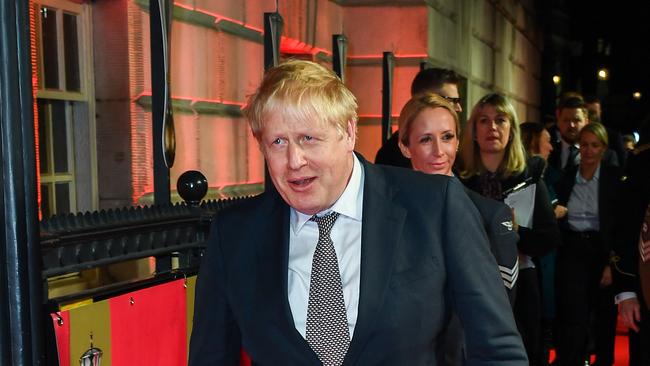Boris Johnson must embrace the detail of climate debate

Boris Johnson, she said, does not “get” climate change. In a sense she is right — but not in the way she thinks. The once-sceptical British Prime Minister has been acting with the zeal of the converted on climate change and is all set to achieve “net zero” UK climate emissions by 2050. Whether he “gets” what this promise will require is another matter.
This week, for example, he posed with David Attenborough in London’s Science Museum to announce plans for the coming COP26 summit, pledging that Britain will take global “leadership” in cutting carbon. As part of this, he announced a ban on the sale of hybrid cars, which will start in 2035. It led to immediate uproar: banning petrol cars was one thing, but why add hybrids to the ban? Is the humble Toyota Prius now verboten? And why would motorists now buy a hybrid as a stepping stone to a fully electric car?
Britain has made astonishing progress in cutting energy consumption and carbon emissions in recent years. We have learned to tread more lightly on the planet. Our use of energy peaked in 2001 and has fallen by almost a fifth since then. We are travelling less and the average new car now drives 50 per cent further using the same amount of petrol. Air is the cleanest it has been since records began, with carbon emissions at their lowest level since Victorian times. This astonishing feat has been achieved through a combination of new technology and the free market.
So it’s right for Britain to be ambitious. We have decarbonised our economy faster than any of the 25 other countries whose leaders will be at the COP26 summit. But even our current world-beating trajectory is not enough to hit a 2050 target: this needs a step change — and significant government intervention. Industry cannot be expected to do the work itself. An early ban on hybrid cars is a taste of the kind of medicine that will be necessary. It’s time Johnson admitted that a great many other changes will follow.
The Climate Change Committee, which drew up the net zero plan, spells out what it would mean. New homes should stop being connected to the gas grid within five years, tree planting must treble, farmers should give one field in five back to nature. And the cost? The committee is, again, admirably candid: between 1 per cent and 2 per cent of economic output, which works out as £20bn ($38.4bn) to £40bn a year. This is the equivalent of an HS2 high-speed rail project every three to five years. But while high-speed rail has been subject to several feasibility reviews to ensure the right plans are in place, the “net zero” target has not.
If Johnson intends to position Britain as a global leader in a “net zero” project, using the chairmanship of the COP26 to rally others, then he ought to have the courage to spell out the implications. Does he agree with cost estimates? He won’t say. If he’s serious about the 2035 electric car target, how does he plan to equip Britain with enough charging points? Are there plans in place to build an energy grid large enough to power the nation’s electric cars? There is no answer.
Perhaps this is because, as French President Emmanuel Macron has found, the answers do not always go down very well. Problems arise for politicians when they position themselves as environmentalists without preparing people for the steps needed to achieve their aim. Stunning advances in green tech — especially in solar and wind power — mean that it is rational to hope for the emergence of even more powerful tools than we have today. But as a recent study from Imperial College London pointed out, this will not prevent the need for big lifestyle changes.
It could well be that alternative technology — be it electric or hydrogen vehicles and their associated infrastructure — will be ready to take over from fossil fuels by 2035, but it cannot be taken for granted. Batteries remain very expensive and rely on rare metals which can only be mined in politically unstable parts of the world. Advances in storage capacity have been disappointing. As Greenpeace points out, there is not much point in switching to electric vehicles if the electricity they use is itself generated by fossil fuels — or if the parts needed to build the car are just as damaging to the planet.
If Britain seeks to be a world leader at the COP26 summit, this means explaining how the UK believes it can reach its targets. To declare that things are magically going to happen in 15 or 25 years will not be enough. Johnson’s approach to HS2 — that it’s a nice idea, so people should stop moaning about the cost — is a risky approach when applied to government more broadly. Labour leader Jeremy Corbyn promised all kinds of wonders at the last election without being able to account for how he’d fund them: voters were unimpressed.
Polls show significant support for ambitious environmental targets. The public is ready for a serious conversation about exactly what’s needed to achieve them; Johnson must join the debate.
The Spectator



After being sacked as the chairman of the COP26, the UN climate conference which is to take place in Glasgow later this year, Claire Perry O’Neill did not lose any time in settling scores.